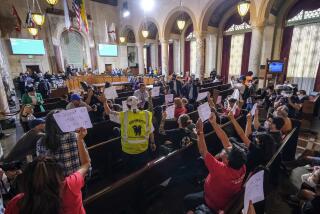It’s a game of musical meeting dates
- Share via
Question: Our association’s bylaws clearly state that board meetings shall take place on the second Wednesday of every month. The first meeting following an election is to take place on the second Wednesday of the next month. But at that meeting, our board changed the meeting date for the following month. It sent out minutes giving notice to all owners of the new date. Then, before that date, the board canceled that meeting but did not give notice to all owners of the cancellation. Instead, the board held the meeting on the scheduled date noted in the bylaws. Sometimes board members change the meeting dates several times among themselves and do not inform owners of cancellations or new dates. They do not give notice because their attorney told them “if it is in the bylaws no notice needs to be given.” Owners are not attending meetings because the dates keep changing or they’re unaware a meeting will take place. However, the board ends up having their meeting on the date set in the bylaws. The board thinks nothing of doing this and they have said they “don’t care what the owners think.” Does this sound right?
Answer: If the “one and only” meeting that took place or was set to take place transpired on the date stipulated in the bylaws, then no new notice was or is required for that meeting. However, your board eliminated that option by choosing a date different from that stipulated in the association’s bylaws, thereby negating that original meeting date owners relied upon.
When a board chooses a meeting date other than the date set in the bylaws, the new meeting is no longer held in accordance with the bylaws. Notice of any cancellation or change in the new meeting date must be given anew to every titleholder, and failure to do so is a violation of the Common Interest Development Open Meeting Act, Civil Code section 1363.05.
Merely because the board canceled the duly noticed new meeting date, the board cannot thereafter revert to the stipulated meeting date in the bylaws. In this case, for each board meeting date set to transpire after the initially canceled or rescheduled meeting, a newly generated notice must be given to every titleholder of any meeting date set to take place, including the one stipulated in the bylaws.
The attorney’s advice is wrong because the board intentionally created a different meeting date. The board cannot then rely or “fall back” on the date in the bylaws and fail to give notice of that change.
When attorneys give advice that is intended to exclude owners from the meetings, whether intentionally or negligently, those attorneys deserve to be reported to the state bar for violating their ethical and professional obligations. Even though the homeowners are not his clients, he is advising his client (the association) to break the law by violating the Open Meeting Act. Purposely changing meeting dates and keeping their actions secret, coupled with an attitude of disregard for the rights of property owners, serves to disenfranchise owners, putting their properties at risk.
The actions of your board members raise suspicions that they may be engaged in activity that violates their fiduciary duty to the association and titleholders. It is an indication that something wrong, possibly illegal, and potentially damaging to the association is going on.
Titleholders must be brave enough to challenge attorney and board actions like these.
Stephen Glassman is a writer and an attorney. Donie Vanitzian, J.D., is a writer and arbitrator. Questions for them can be sent to P.O. Box 11843, Marina del Rey, CA 90295, or e-mailed to noexit@mind spring.com.
More to Read
The biggest entertainment stories
Get our big stories about Hollywood, film, television, music, arts, culture and more right in your inbox as soon as they publish.
You may occasionally receive promotional content from the Los Angeles Times.










